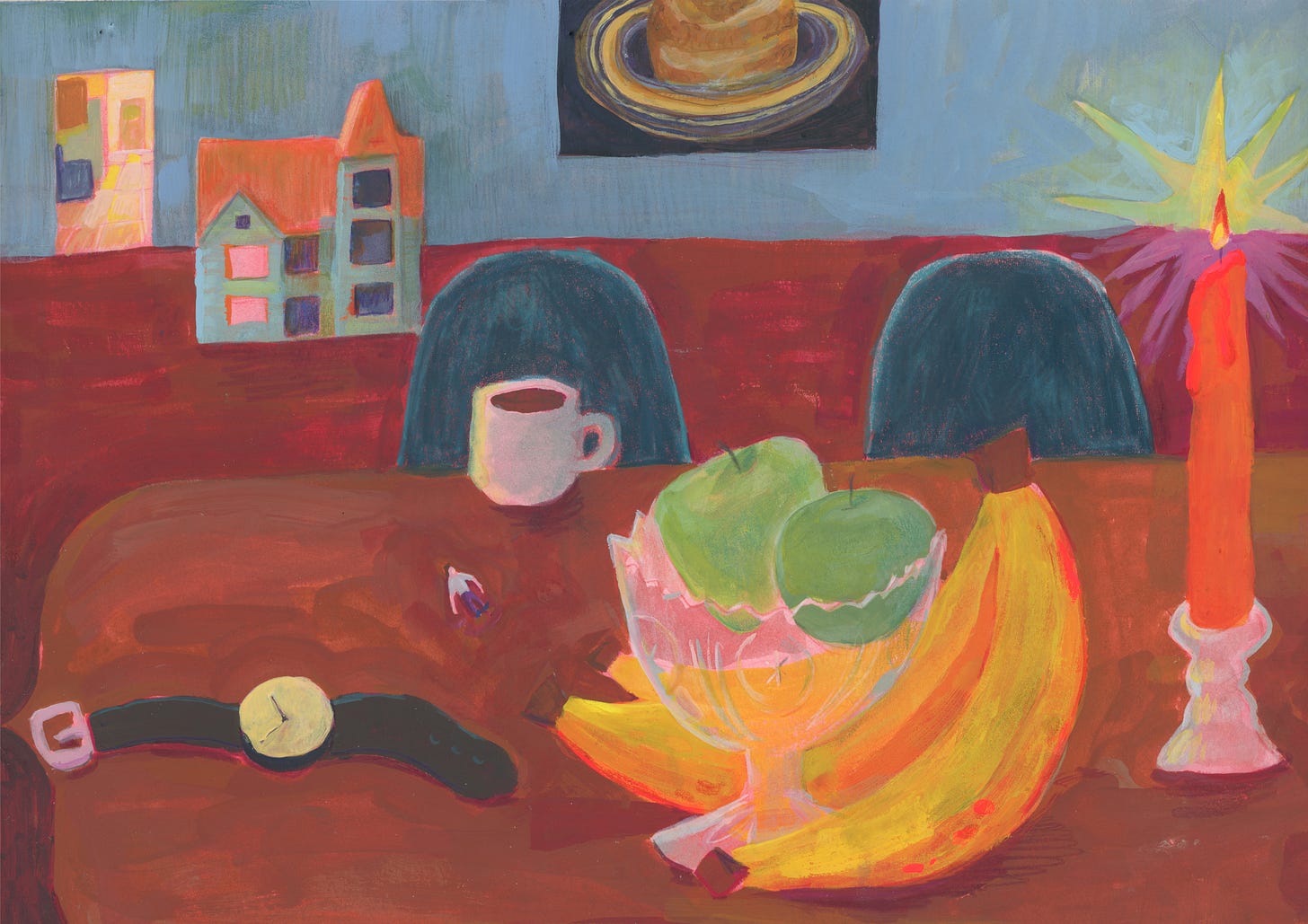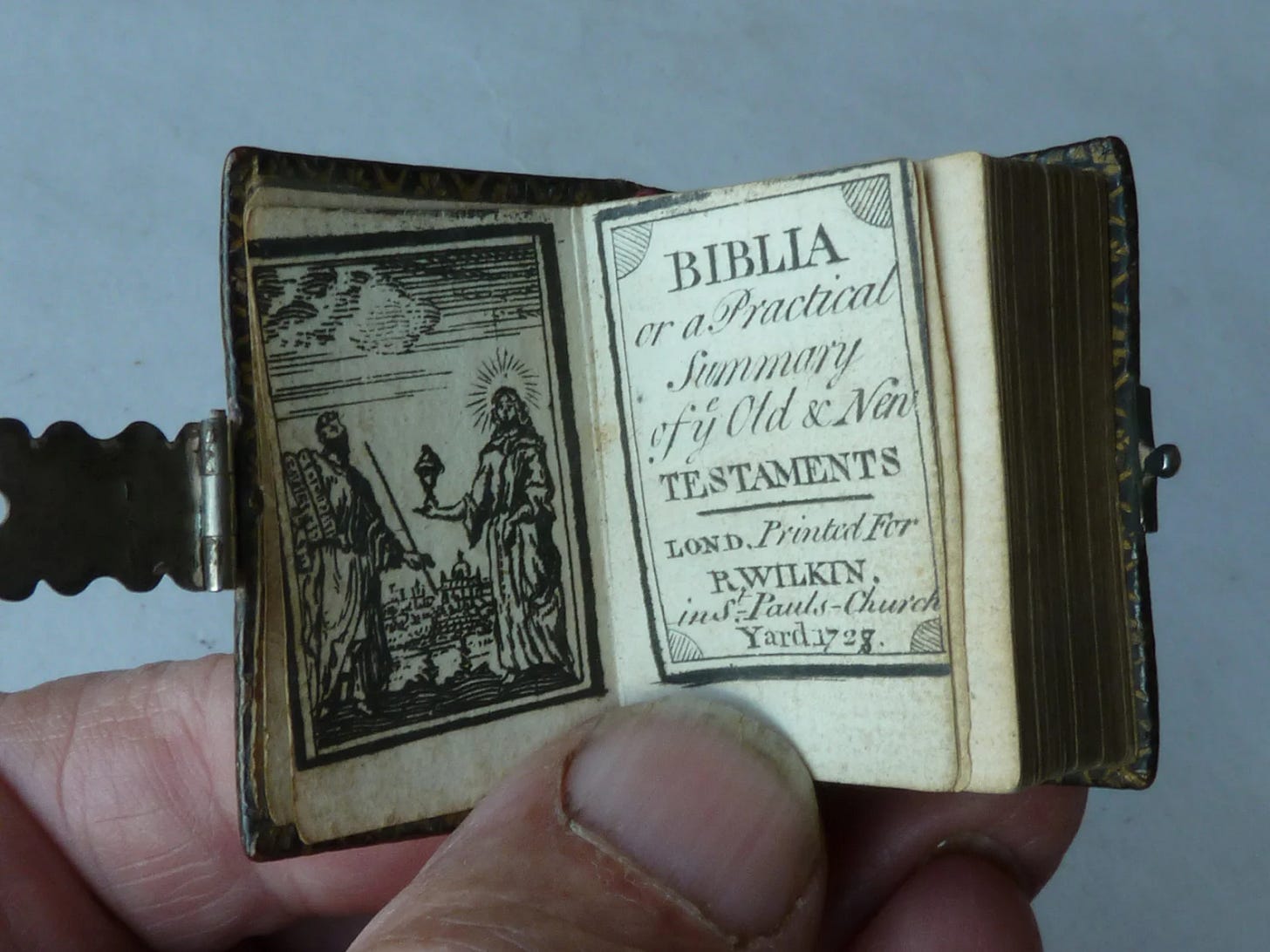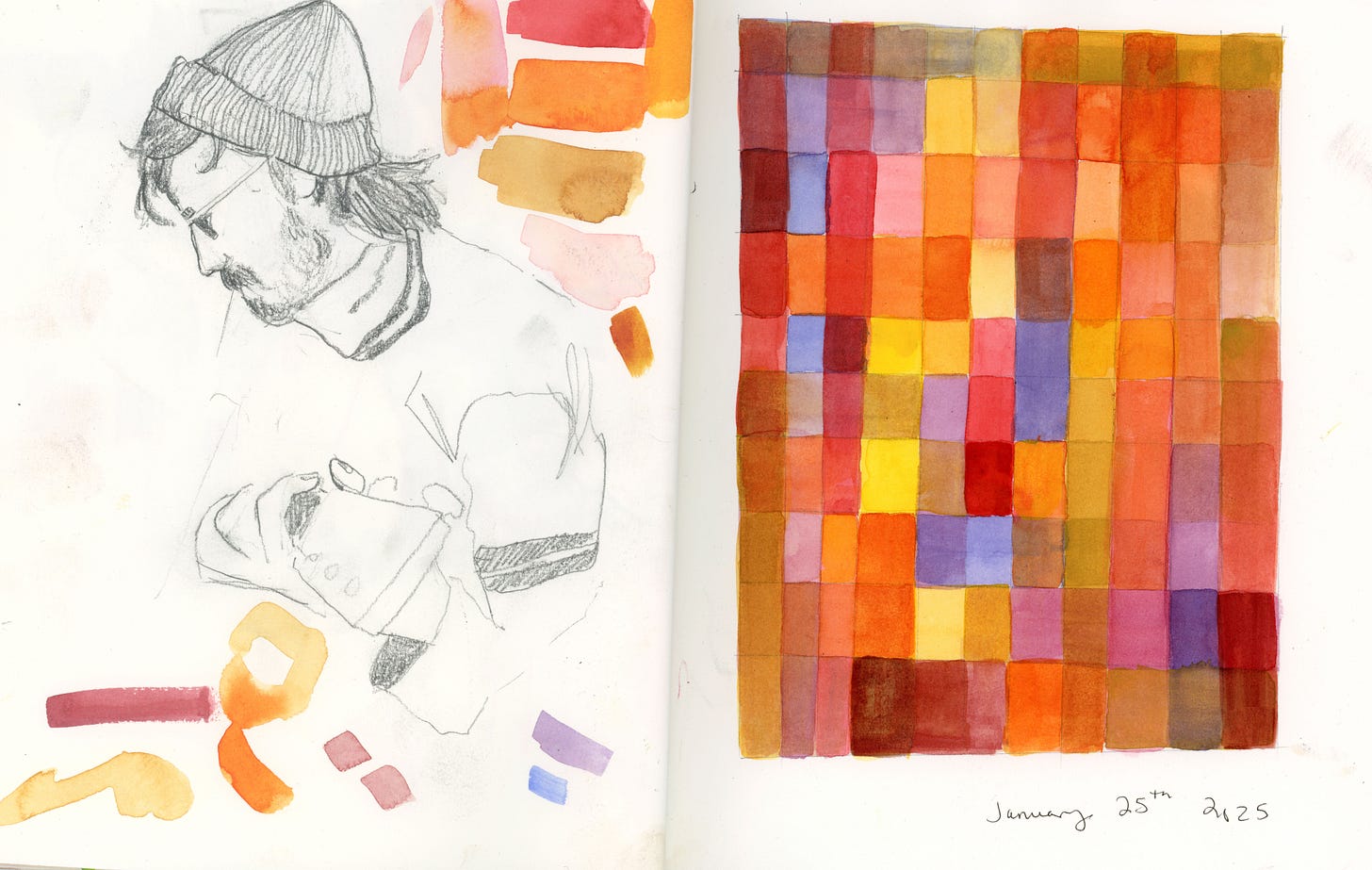How to be Small
Meditations on miniaturization
If you enjoy these reflections, consider joining me for Gather & Patch, a online group to discuss art through a therapeutic and ritualistic lens. It will be held January 30th, at 6pm CST. Subscribers will receive a zoom link the day before.
One must become small to see oneself fully. This is an uncomfortable truth to hold, but an important one. For many months I have been writing from the perspective of a doll’s house. I’ve been shrinking myself down in scale through writing about, painting and photographing a doll house that lives in the corner of my dining room.
On the wall behind it, there is a large print of my friend Daniel’s painting of Saturn. I pass by the image of a beat up doll house and Saturn every day. Dropping my keys on the table and unlacing my shoes, I take time to consider the dialectics of big and small and where I exist on this continuum. At the end of each day, while walking through my front door of my house, I practice a meditation on miniaturization. I extend my awareness to my street, my block, my neighborhood, my city, state, country, planet, solar system and universe. In this way, I became small.
This change in perspective has been unsettling, to say the least. But I have learned to accept my small stature with grace. I do not find it to be a deficit. In fact, there are many benefits. The paradigm we exist in together tells us expansion is the only route to significance. This is arrogance. Scale is relative.
People have an innate love for small things. Many today do not see the importance, but I can see how popular miniatures are on Youtube, and I am relieved to find that this love survives. At the library recently, I read a book titled Small Things in the Eighteenth Century: The Political and Personal Value of the Miniature. In it, I discovered court cases where people sued one another over stolen buttons and handkerchiefs. People in the eighteenth century also spent many hours painstakingly crafting thumb bibles for children that were certain to be lost or damaged almost immediately.
Thumb bibles were made in time when doing the dishes would have taken several days, from the making of the lye soap to gathering water, chopping wood to scouring the pan. The paper for miniature books had to be grown from linen or cotton, cut and bound by the nimblest of fingers and type set in the tiniest font without smudging the ink. Why all this fuss over something so ephemeral? Was this a meditation on miniaturization?
Miniature things, people and moments contain the divine and infinite. If this wisdom is forgotten, I’m not convinced that life would be worth living.
On my couch, my partner tells me of people who call themselves accelerationists . These people say that the past must be forgotten—that all we have to look forward to is a dissolving, automated future. This is the world view of the people who have seized ownership over the earth’s resources and write the algorithms that influence our world view.
Perhaps these men are large and we are small. So be it. Still, David practices his scales on his guitar. I study the shape his fingers make and sketch them, and practice color relationships in my sketchbook. Sometimes he hits the wrong notes and my watercolor blooms, but my meditations on miniature help me to know that these small actions are significant.
History books are full of foolish tyrants who overestimate their own significance while their subjects go hungry. They eventually met the same fate as their subjects, and while we might know their names, only a few factoids are known of them. They, too, will eventually fade into obsolescence.
Consider Ramessess II, a pharaoh of ancient Egypt who enslaved people to build monuments in his own image. In 1817 a fragment of his statue was found and brought to the british museum. The statue bore the inscription:
“King of Kings Ozymandias am I. If any want to know how great I am and where I lie, let him outdo me in my work.”
Hearing of the museum’s new acquisition, Percy Bysshe Shelley wrote his infamous poem Ozymandias:
I met a traveller from an antique land,
Who said—“Two vast and trunkless legs of stone
Stand in the desert. . . . Near them, on the sand,
Half sunk a shattered visage lies, whose frown,
And wrinkled lip, and sneer of cold command,
Tell that its sculptor well those passions read
Which yet survive, stamped on these lifeless things,
The hand that mocked them, and the heart that fed;
And on the pedestal, these words appear:
My name is Ozymandias, King of Kings;
Look on my Works, ye Mighty, and despair!
Nothing beside remains. Round the decay
Of that colossal Wreck, boundless and bare
The lone and level sands stretch far away.”
The poem remembers not only the tyrant, but also the sculptor. The tyrant who lived his life trapped in his own grandiosity is now mocked by his own words. History will repeat itself, and in a strange way, I find comfort in this.
History is mundane. It happens in your house. This has always been so, but our perception has become limited to the grandiose. I worry that people will forget the importance of their own small actions in the shadow of our rulers.
The artist is at their best when understanding that significance is not measured by scale, but by the depth of attention given to small things and moments. For a truly expansive experience of life, there must first be a moment of contraction. It is not possible to see clearly without giving attention to what is small.






Automatic subscribe. This was wonderful and so spot on. In a world where there is the capability to have millions of subscribers and throngs of followers, true resonance often begins in one’s neighborhood and community. Those that often grow big begin small. The seed contains the oak. This has spurred a bunch of thoughts. Thank you for your share. Awesome watercolors btw.
It's so true that our perception has been kind of warped by the grandiose, as you say, or by the giant--going viral, being global, when it's all also living in the particular and specific--the moment. In the dominant culture right now, we equate small with insignificant, and that perception costs us dearly. I love your exploration here. And I appreciate the Ozymandias reminder.